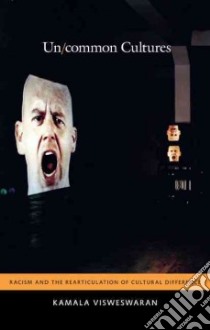Un/Common Cultures - 9780822346357
Un libro in lingua di Kamala Visweswaran edito da Duke Univ Pr, 2010
- € 26.50
- Il prezzo è variabile in funzione del cambio della valuta d’origine
In Un/common Cultures, Kamala Visweswaran develops an incisive critique of the idea of culture at the heart of anthropology, describing how it lends itself to culturalist assumptions. She holds that the new culturalism - the idea that cultural differences are definitive, and thus divisive---produces a view of "uncommon cultures" defined by relations of conflict rather than forms of collaboration. The essays in Un/common Cultures straddle the line between an analysis of how racism works to form the idea of "uncommon cultures" and a reaffirmation of the possibilities of "common cultures," those that enact new forms of solidarity in seeking common cause. Such "cultures in common" or "cultures of the common" also produce new intellectual formations that demand different analytic frames for understanding their emergence. By tracking the emergence and circulation of the culture concept in American anthropology and Indian and French sociology, Visweswaran offers an alternative to strictly disciplinary histories. She uses critical race theory to locate the intersection between ethnic/diaspora studies and area studies as a generative site for addressing the formation of culturalist discourses. In so doing, she interprets the work of social scientists and intellectuals such as Elsie Clews Parsons, Alice Fletcher, Franz Boas, Louis Dumont, Claude Levi-Strauss, Clifford Geertz, W. E. B. Du Bois, and B. R. Ambedkar.
"Un/common Cultures is a profound and important book, a major intervention in anthropology and cultural, feminist, and South Asian studies. It has all the hallmarks of Kamala Visweswaran's work: impeccable scholarship and a keen sense of purpose that is both activist and intellectual."---R. Radhakrishnan, author of History, the Human, and the World Between
"In Un/common Cultures Kamala Visweswaran provides an acute, historically informed diagnosis of the relative weakness of the culture concept so central to American anthropology, and a provocative, and fascinating explanation of why, during the past two decades, other fields and interdisciplinary arenas have developed more cogent critiques of culture. This first-rate book will be read widely and generate much discussion."---George E. Marcus, co-author of Designs for an Anthropology of the Contemporary
Informazioni bibliografiche
- Titolo del Libro in lingua: Un/Common Cultures
- Sottotitolo: Racism and the Rearticulation of Cultural Difference
- Lingua: English
- Autore: Kamala Visweswaran
- Editore: Duke Univ Pr
- Collana: Duke Univ Pr (Paperback)
- Data di Pubblicazione: 01 Aprile '10
- Genere: SOCIAL SCIENCE
- Argomenti : Race Culture Anthropology
- Pagine: 341
- ISBN-10: 0822346354
- EAN-13: 9780822346357


